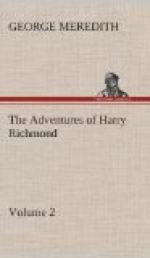smoothly, and a wonderful fair country nodded drowsy.
From that to cock-crow at a stride. Sleep was
no more than the passage through the arch of a canal.
Kiomi and I were on the heath before sunrise, jumping
gravel-pits, chasing sandpipers, mimicking pewits;
it seemed to me I had only just heard the last of
Osric’s fiddle when yellow colour filled in
along the sky over Riversley. The curious dark
thrill of the fiddle in the tent by night seemed close
up behind the sun, and my quiet fancies as I lay dropping
to sleep, followed me like unobtrusive shadows during
daylight, or, to speak truthfully, till about dinner-time,
when I thought of nothing but the great stew-pot.
We fed on plenty; nicer food than Rippenger’s,
minus puddings. After dinner I was ready for
mischief. My sensations on seeing Kiomi beg of
a gentleman were remarkable. I reproached her.
She showed me sixpence shining in the palm of her
hand. I gave her a shilling to keep her from
it. She had now got one and sixpence, she said:
meaning, I supposed upon reflection, that her begging
had produced that sum, and therefore it was a good
thing. The money remaining in my pocket amounted
to five shillings and a penny. I offered it
to Kiomi’s mother, who refused to accept it;
so did the father, and Osric also. I might think
of them, they observed, on my return to my own house:
they pointed at Riversley. ‘No,’
said I, ‘I shan’t go there, you may be
sure.’ The women grinned, and the men yawned.
The business of the men appeared to be to set to work
about everything as if they had a fire inside them,
and then to stretch out their legs and lie on their
backs, exactly as if the fire had gone out. Excepting
Osric’s practice on the fiddle, and the father’s
bringing in and leading away of horses, they did little
work in my sight but brown themselves in the sun.
One morning Osric’s brother came to our camp
with their cousin the prizefighter—a young
man of lighter complexion, upon whom I gazed, remembering
John Thresher’s reverence for the heroical profession.
Kiomi whispered some story concerning her brother
having met the tramp. I did not listen; I was
full of a tempest, owing to two causes: a studious
admiration of the smart young prizefighter’s
person, and wrathful disgust at him for calling Kiomi
his wife, and telling her he was prepared to marry
her as soon as she played her harp like King David.
The intense folly of his asking a girl to play like
David made me despise him, but he was splendidly handsome
and strong, and to see him put on the gloves for a
spar with big William, Kiomi’s brother, and evade
and ward the huge blows, would have been a treat to
others besides old John of Dipwell Farm. He
had the agile grace of a leopard; his waistcoat reminded
me of one; he was like a piece of machinery in free
action. Pleased by my enthusiasm, he gave me
a lesson, promising me more.
‘He’ll be champion some day,’ said Kiomi, at gnaw upon an apple he had given her.




